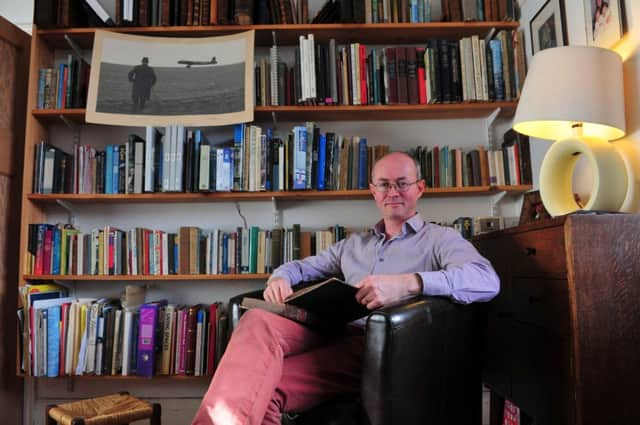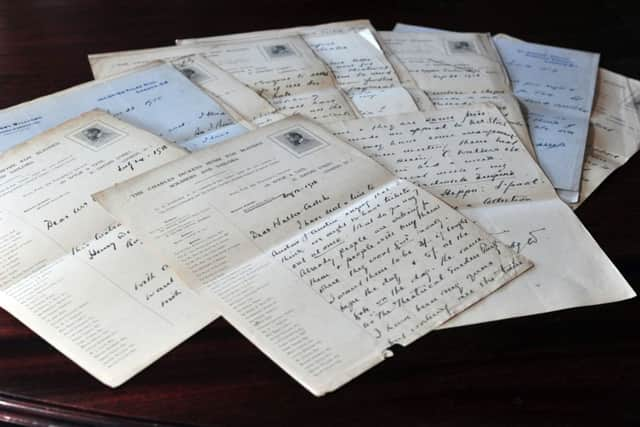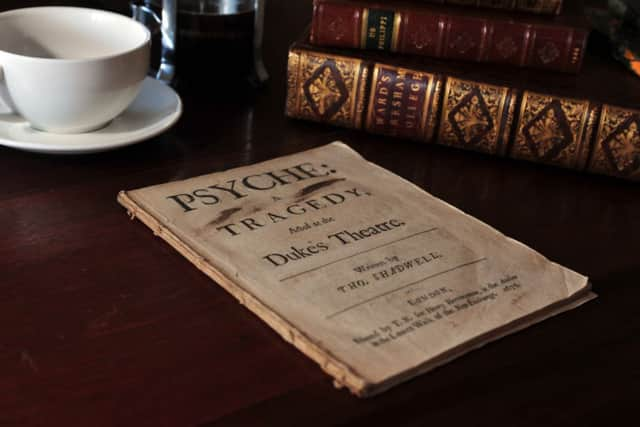Why you’ll never make a fortune out of e-books


Occasionally after dinner, Christian White will grab a centuries-old book from the shelves which line one wall of the living room of his home in Ilkley. He’ll put it in the middle of the kitchen table, with the hope of firing the imagination of his six children about the possibility and potential of the printed word.
Sometimes he chooses a great big volume, the kind generally seen behind glass cabinets in museums; other times he opts for something more delicate, a pamphlet of poetry perhaps or a journal handwritten in some ancient language. Whatever he chooses, the reaction tends to be the same.
Advertisement
Hide AdAdvertisement
Hide Ad“The younger ones are often enthusiastic, but the older ones slink away and I can see them thinking, ‘Oh God, it’s dad again with his old books’. However, after a while, often when the question of how much it’s worth comes up, they become interested again. It’s at that this point one of them will often ask, ‘How long would Wayne Rooney have to work to be able to buy this?’ The answer is generally about half an hour.”


It’s the kind of response that would have some book dealers crying into a Shakespearean First Folio. However, Christian is a born optimist. Given that he’s chosen to be a book dealer in the Kindle age it’s probably just as well.
“When anyone talks about the physical book becoming obsolete, I always remind them what happened to horses,” he says, beginning what you suspect is a now well-rehearsed argument. “With the arrival of the motor car, horses stopped having any commercial significance, but we didn’t get rid of them altogether. People still use them for pleasure, because they are beautiful creatures in their own right. I like the feel of turning a page, I like the smell of a bookshop and I like seeing the books I have read and loved sat on the shelf with a slightly wrinkly spine. It will be interesting to see what happens as this current generation grows up, but I still believe there will always be a place for books.”
Christian never set out to be a book dealer. Having studied English literature at Cambridge, he completed a PhD in 17th century English essays at Leeds University which he says cured him of any lingering desire to be an academic. Instead he went to work for the BBC, which ultimately took him to Westminster where he spent his days filing political reports for local and regional radio stations. He loved the job, but when family came along and his wife was keen to move back to Yorkshire to be nearer her parents, he needed to find a new career.
Advertisement
Hide AdAdvertisement
Hide Ad“I’d always collected books and had entrepreneurial instincts, so becoming a book dealer seemed a natural next step. I remember once walking down the road with a friend and seeing a whole box of old books outside a terraced house. The property was owned by a book dealer who was going through his stock. I asked if he would mind if I took the paperbacks he didn’t want and when he said no, I gathered as many as I could and headed into town. I walked away with about 20 to 30 books for nothing and made about £20. I remember thinking, ‘this is not a bad way to earn your beer money’.”


With six children aged between 14 and two, Christian needs to earn more than just beer money, but with the majority of books he sells now ranging from between £50 and £5,000 he’s moved on from cheap paperbacks. Most of his business is done online through his website Modern First Editions – don’t let the name deceive you, when it comes to books, modern means anything from about 1600 onwards – and he has a global customer base.
“The industry has changed hugely. Not all that long ago people bought and sold through dedicated shops or trade magazines and dealers like me would have relied on book runners. They were basically middlemen between the sellers and the dealers. They bought stock in the morning and sold it in the afternoon. It was a cash-only business, but only a handful are still working these days because the internet opened the market up.
“If you go online right now you could probably find 10 to 15 first editions of any novel by Virginia Woolf. They would still set you back £5,000 a piece, but if you’ve got the money they are readily available.
Advertisement
Hide AdAdvertisement
Hide Ad“I knew that if I was going to make a living out of secondhand books I had to offer something different.”
That “something different” was signed editions. His website is currently offering a copy of The Chimes signed by Arthur Rackham for £200, an early reprint of Alice’s Adventures in Wonderland with a letter from the original illustrator for £300 and various other curiosities, including what he describes as the “irresistibly titled” The Bankrupt Bookseller for £75. He also sells prints and letters and his current favourite item is a photograph of Winston Churchill watching a Sterling Bomber take off. Dated, June 6, 1941 and signed by both the wartime PM and the pilot, he hopes to sell it for £800.
“Fantastic isn’t it?,” he says, admiring the large black and white image. “I got it at an auction in Suffolk and I just love it. If I could afford to keep it, it is the kind of thing I would like to hang on my wall, but as a dealer you can’t think like that. Whatever I buy, I have to sell. I am a recycler.”
While Christian admits the rare book industry hasn’t been recession proof, even when business slowed a little there were enough dedicated – some would say obsessive – collectors to keep the trade ticking along.
Advertisement
Hide AdAdvertisement
Hide Ad“Book collectors are probably 80 per cent men and once you have caught the bug it can become a very expensive hobby. I have been at fairs where customers have agonised about how to pay for a particular item without their wife finding out. Many of the great libraries were set up by 18th century aristocrats, but there are people right now who are building their own private collections. For some, once they’ve started it’s impossible to stop. They might never read the books they’ve bought, but the important thing is they know they’re there.”
For Christian the appeal is the same as anyone who has queued up to have an old family heirloom valued by an Antiques Roadshow expert. Most will leave disappointed, but every so often someone will discover the old ceramic dish which has been stood on the sideboard for as long as anyone can remember is worth thousands.
“My best find so far was complete luck. I met a woman at a book fair who was disposing of her late husband’s collection and she offered me a copy of George Chapman’s translation of Homer’s Iliad from the early 17th century. It had a number of pencil markings on various pages and we joked that the next owner would probably immediately get an eraser and rub them out.
“However, before I sold it on, I happened to be doing some research at the Brotherton Library in Leeds where I came across an image of some markings which looked uncannily similar. It turned out that they were used by Samuel Johnson to mark out words which he wanted to include in his dictionary. At the time just 11 books had been found with those annotations and that copy of Homer made it 12. It was a total fluke, but it turned a £3,000 book into a £30,000 one.”
Advertisement
Hide AdAdvertisement
Hide AdA specialist in Shakespeare, Christian’s Holy Grail would be discovering a Hamlet or a King Lear published in what’s known as a quarto format.
“The quartos were essentially acting texts. Printed on thin paper, they weren’t designed to have much longevity and as a result very few have survived. I think the only way I might find one might is it if it had been caught up in a bunch of less important quartos and forgotten about. One of the major plays would probably sell for a million pounds. It’s not why I do the job, but I think there’s an element of the treasure hunter in every book dealer.”
While Christian’s expertise lies in historic literature, there is also a lucrative market for more contemporary books. Stumble across a signed first edition of JRR Tolkien’s The Hobbit and it will likely fetch £100,000, a first edition of the first Harry Potter, signed by JK Rowling, is currently valued at around £25,000 and even the 2012 novel Gone Girl, written by Gillian Flynn is worth around £50.
“Not bad for a book out only a couple of years ago,” says Christian. “Just like any industry, fashions for particular books come and go. If you went back 20 or 30 years there was a massive market for Yorkshire topography. Back then if you wanted to learn about the geology and history of a local area the only way to find out about it was through books, but again that changed with the internet.
Advertisement
Hide AdAdvertisement
Hide Ad“Predicting what will be the next big thing is almost impossible, although it doesn’t make knowing you lost out on a windfall any easier to bear. I have a journalist friend who vividly remembers receiving a first edition of Harry Potter and the Philosopher’s Stone in the post. He also vividly remembers chucking it straight in the bin.
“The only thing I would say is buy what you love, because whatever happens to the monetary value, that emotional attachment won’t change.”
• www.modernfirsteditions.com